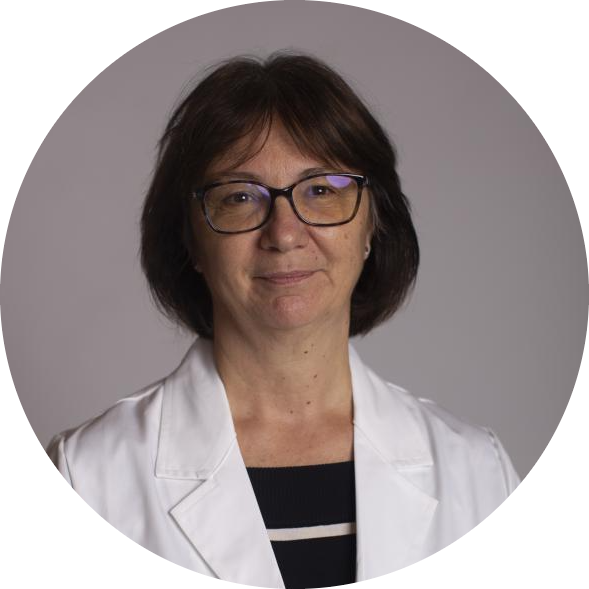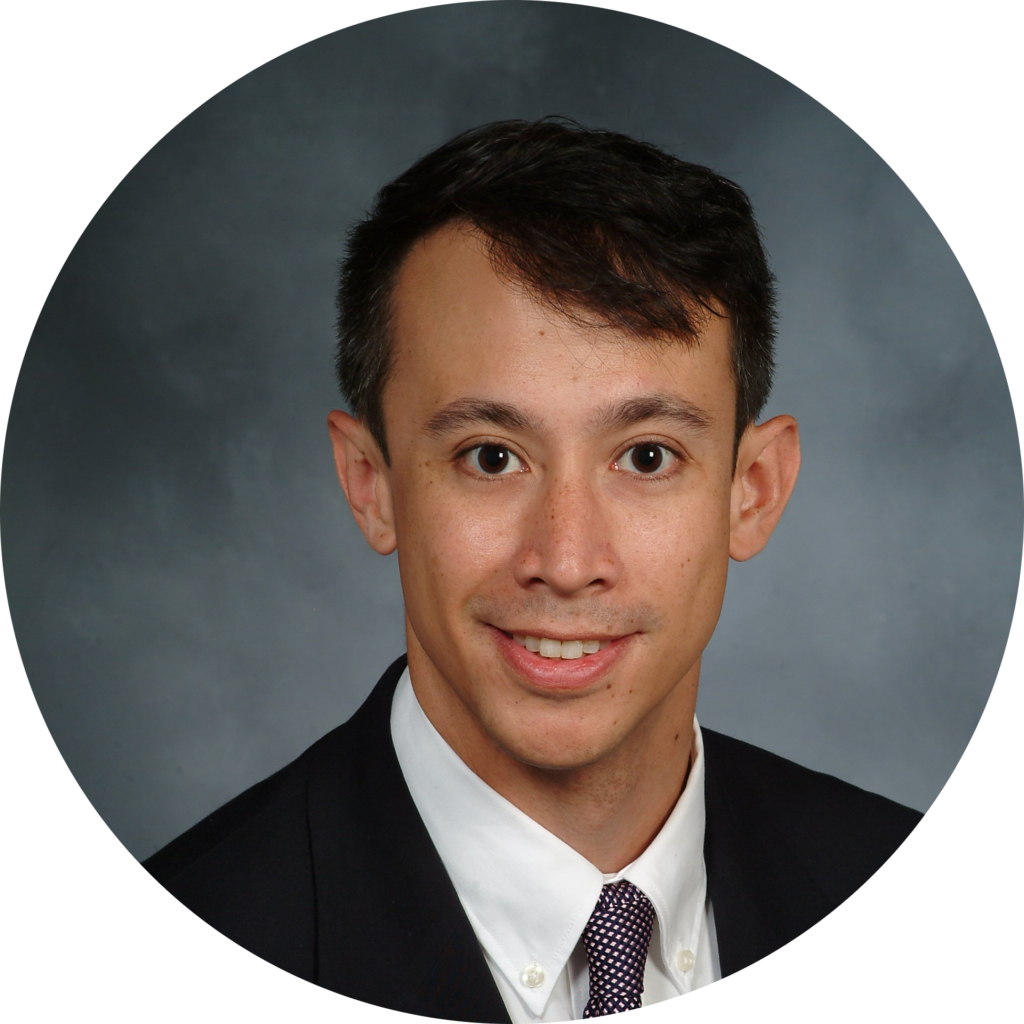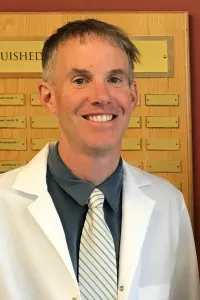Each year the ULF hosts an interesting and compelling agenda of leukodystrophy topics presented by global leukodystrophy experts who share their latest work and broad perspectives with an audience that includes scientists, clinicians, medical professionals, industry leaders, and patient advocacy leaders. Learn more about our featured speakers of our 2024 Scientific Symposium taking place on Thursday, June 27th 2024.

Dr. Geneviève Bernard
ULF MSAB Chair
McGill University
Geneviève Bernard, MD, MSc, FRCPc, pediatric neurologist at the Montreal Children’s Hospital and a researcher with the Child Health and Human Development Program at the Research Institute of the McGill University Health Centre in Montreal.
Dr. Geneviève Bernard is a world-renowned expert on genetically determined white matter disorders, more specifically leukodystrophies. These rare and fatal neurodegenerative diseases typically develop in previously healthy children. Despite several advances over the last few decades, 20 to 30 percent of these children do not have a precise molecular diagnosis, and evidence-based data is strongly lacking.
Dr. Bernard established a comprehensive research program aimed at characterizing leukodystrophies clinically, radiologically, genetically and pathophysiologically. With her research team, identified the genetic cause for POLR3-related leukodystrophy. In the same vein, with her international colleagues, she also developed best practices. These include a consensus statement on the symptomatic management of leukodystrophy patients. Dr. Bernard has published over 80 peer-reviewed articles, including a genotype-phenotype correlation study in neurology.
“It is no wonder that patients are referred to her clinic from all over the world,” concludes Laurence Gauquelin, MD, FRCPC, pediatric neurologist at the Centre hospitalier de l’Université Laval (CHUL).

Dr. Marjo S. van der Knaap, Amsterdam UMC
Marjo van der Knaap trained in adult and pediatric neurology and in neuro-MRI. In 2000, she founded the Amsterdam Leukodystrophy Center, in which patient care and clinical and basic research are integrated. She is professor and head of Child Neurology of the Emma Children’s Hospital / Amsterdam University Medical Center and professor of Translational Neurosciences, Vrije Universiteit Amsterdam. Since 1987, her research is focused on white matter disorders, especially genetic disorders (“leukodystrophies”). She developed MRI pattern recognition to facilitate diagnostics and subsequently applied it to define novel disorders. Newly defined disorders include vanishing white matter (VWM), megalencephalic leukoencephalopathy with subcortical cysts (MLC), Leukoencephalopathy with Brainstem and Spinal cord involvement and Lactate elevation (LBSL) and several others. Her group identified numerous mutated genes for newly defined leukodystrophies. Further studies of her group focus on pathomechanisms and in the most recent years on therapy development. Her group identified the favorable effects of Guanabenz, an antihypertensive drug, on VWM. In 2021, she started the first therapeutic clinical trial in VWM using Guanabenz.
She is co-author of the book Van der Knaap MS, Valk J. Magnetic resonance of myelination and myelin disorders. Springer, 1989, 1995 and 2005, an international standard. She co-authored over 450 peer-reviewed papers in international scientific journals. She received several awards, including ISMRM gold medal (1999), Winkler medal of the Dutch Society of Neurology (2000), ASNR honorary membership (2001), ICNA Prichard award (2002), AAN Sidney Carter Award (2008), Dutch Spinoza award (2008), ASPNR gold medal (2014) and EPNS Aicardi award (2022). She is member of the Dutch Royal Academy of Sciences (since 2010).

Dr. Marianna Bugiani, Amsterdam UMC
Since 2001, MB has focused on childhood glial degenerative, metabolic and tumor disorders. She holds specific expertise in clinical practice (clinical neurology, neuroradiology and functional neuroimaging), diagnostics (neurogenetics, biochemistry and neurophysiology), animal and comparative neuroanatomy, and clinical and basic research, and developed a multidisciplinary approach for the identification and study of the disease mechanisms of white matter disorders.
Since 2007, MB is appointed at the VU University in Amsterdam. Here, she obtained a degree in (neuro)pathology and a PhD in neuroscience (cellular and molecular biology of glial cells). She is an active member of the Amsterdam leukodystrophy center, the tissue biobank of which she coordinates. Her studies have contributed to a paradigm shift in the concept of leukodystrophies, from genetic diseases of myelin to diseases due to defects in any structural component of the white matter. As a consequence, she also put forward a new classification of these disorders. Her current research focusses on the role of astrocytes and their spatial and temporal heterogeneity in leukodystrophies, aiming at understanding how the loss of essential astrocytic functions and gain of detrimental functions impacts all aspects of white matter degeneration and influences endogenous repair.
In parallel, MB is an active teacher within the Amsterdam residency school in pathology, focussing on the fields of post-mortem, paediatric, eye and neuropathology. She is also active in teaching bachelor and master students in beta disciplines, including Medicine and Surgery.

Dr. Tzipora Falik-Zaccai,
Galilee Medical Center,
Ban-Ilan University
Prof. Tzipora C. Falik-Zaccai is an Associate Professor of Medical Genetics & Pediatrics and the founder and Director of the Institute of Human Genetics at the Galilee Medical Center, The Azrieli Faculty of Medicine, Bar-Ilan University.
Board certified in Pediatrics (Israel) and Medical Genetics (Israel and the USA), she is a member of the R&D committee and Ethics committee at The Galilee Medical Center where she was elected as the outstanding physician for the year 2009.
Prof. Tzipora Falik-Zaccai serves a variety of roles in the Azrieli Faculty of Medicine-Bar Ilan: She is the vice dean for medical research and directing the MD PhD program for excellent students, and the human genetic department at the Faculty. She is the mentor of post graduate students and residents in basic science projects.
Prof. Falik-Zaccai has directed her research toward the identification of the causative genes of rare genetic diseases. She and her team also devote their time towards the development of tailored genetic counseling in different ethnic groups, at high risk for genetic disorders and birth defects. This service is aimed at educating, preventing and minimizing the personal burden of birth defects and rare disorders for the benefit of all ethnic communities in Northern Israel. She was honored to open a research center for the study of human genetic diseases granted to Bar Ilan University by Teva pharmaceuticals. Prof. Falik-Zaccai has published many scientific papers in various leading international Journals in the field of Pediatrics, Medical and Molecular Genetics and presented her work in national and international meetings.

Dr. Cristina Cereda,
University Children’s Hospital V. Buzzi, Milan, Italy
Dr. Cristina Cereda is a researcher in genetics, renowned for her work in neurodegenerative diseases. She earned her doctoral degree in Genetics from the distinguished Pavia’s University, solidifying her foundation in advanced genetic and molecular research techniques.
Throughout her career, Dr. Cereda has forged an important path in understanding ALS, related disorders, and, more recently, pediatric rare diseases. Her focus extends to the application of molecular genetic techniques in newborn screening, shedding light on early detection strategies and therapeutic interventions. With expertise spanning genetic factors, pathogenesis, and treatment modalities, her work has been pivotal in studying these fields.
Leading numerous research initiatives, Dr. Cereda secured funding from esteemed institutions including the Ministry of Health and private foundations.
Dr. Cereda is currently the Director of the Regional Laboratory of Newborn Screening. In this capacity, she spearheaded critical programs facilitating early detection and intervention for various genetic disorders in neonates. Her strategic direction led to the implementation of cutting-edge screening protocols, ensuring accurate identification of at-risk infants and timely interventions.
Beyond her impactful research and leadership roles, Dr. Cereda is an active participant in scientific conferences, where she shares her expertise and fosters collaborative discussions. Her commitment to mentoring emerging scientists underscores her dedication to nurturing the next generation of researchers.
Dr. Cereda’s remarkable contributions have earned her numerous awards and honors, a testament to her significant influence in the fields of neurodegenerative research and newborn screening. Her multifaceted approach, seamlessly integrating research prowess, effective leadership, and compassionate patient care, exemplifies her unwavering commitment to improving the lives of individuals affected by these conditions.

Mackenzie Michell-Robinson,
PhD Candidate
McGill University
Mackenzie Michell-Robinson is an MD-PhD student and former Vanier Scholar at McGill University in Montreal, Canada. He has previously worked in neurodevelopment, neuroinflammation, and neurodegeneration research across both academia and industry. His research focus lies in therapeutics development for neurological disease. Most recently, he developed a unique animal model of POLR3-related Hypomyelinating Leukodystrophy in order to advance gene therapy research in pediatric genetic white matter disorders. He favors an interdisciplinary approach and mixed methods spanning traditional in vitro and in vivo neuroscience techniques as well as modern data-driven analysis. His dog Mabel very much likes to go for walks and would prefer if he spent more time outside with her.

Dr. Laura Adang,
Children’s Hospital of Philadelphia
Dr. Laura Adang is an Assistant Professor of Child Neurology at the Children’s Hospital of Philadelphia specializing in the care of children with leukodystrophies. Dr. Adang is a magna cum laude graduate of the University of Georgia’s Foundation Fellowship scholarship program and a graduate of the Medical Scientist Training Program at the University of Virginia, where she received both her M.D. and Ph.D. Her graduate work in the laboratory of Dean H. Kedes M.D. Ph.D. characterized the immune evasion mechanisms of herpesvirus infections. Her work has been published in Cell, Journal of Clinical Investigations, and Journal of Virology, among others.
After graduating from the University of Virginia, she completed her pediatrics and child neurology residencies at the Children’s Hospital of Philadelphia and the University of Pennsylvania. During her training, her research explored the seasonal trends of NMDA receptor encephalitis in children. She has completed additional fellowship training in multiple sclerosis and leukodystrophies as well. Her primary clinical focus is the care of children with white matter disorders and neuroinflammatory conditions. She is an active member of the Child Neurology Society.

Dr. Jamie Fraser,
Children’s National Hospital
Dr. Fraser earned her undergraduate degree in Biochemistry and Molecular Biology from Agnes Scott College in Atlanta, GA, and holds an MD and PhD from The Medical University of South Carolina in Charleston. She completed post-graduate training in Pediatrics at Children’s National Medical Center and in Clinical Genetics and Genomics at the National Human Genome Research Institute of the National Institutes of Health. She then completed her Medical Biochemical Genetics fellowship at the National Human Genome Research Institute. She joined the faculty as an Attending Physician at the Rare Disease Institute, Division of Genetics and Metabolism, Children’s National Medical Center, Washington, DC, in 2016 and holds a faculty appointment as Assistant Professor of Pediatrics at The George Washington University School of Medicine and Health Sciences. She has served as the Director of the Myelin Disorders Program at Children’s National since joining the faculty, and she also serves as the Director of Prenatal Genetics in the Zickler Family Prenatal Pediatrics Institute at Children’s National.
Dr. Fraser’s clinical interests focus on improving the quality of life for individuals with neurometabolic disorders through timely diagnosis, symptom mitigation and management, and support through the natural history of disease progression. Her research focuses on understanding the underlying disease mechanisms in ultra-rare leukodystrophies, establishing clinical trial readiness for these disorders, and identifying new therapeutic interventions for them. Her group has established the natural history of Leukoencephalopathy with Calcifications and Cysts in affected individuals across the lifespan and uses in vivo and in vitro models of LCC to advance our understanding of the disease.

Dr. Erik Mallack,
Kennedy Krieger Institute
Dr. Eric Mallack is an assistant professor of pediatrics and neurology at Weill Cornell Medical College, assistant attending at New York-Presbyterian Hospital, and assistant attending neurologist at Memorial Sloan Kettering Cancer Center. He is the director of the Leukodystrophy Center at Weill Cornell Medicine, and neurologist in the WCM-MSKCC Metabolic Cell and Gene Therapy Program.
Dr. Mallack’s translational research program allies with the Newborn Screening Program and Patient/Parent Advocacy Groups to identify presymptomatic patients with X-Linked Adrenoleukodystrophy. He is investigating the ability of multiple advanced neuroimaging techniques, including diffusion tensor imaging, to identify patients appropriate for stem cell transplant prior to symptom onset. Dr. Mallack is a faculty neurologist in the Center for Neurogenetics which focuses on understanding the genetic mechanisms responsible for abnormal brain development. He is also investigating genotype-phenotype correlations in autism under the Weill Cornell Autism Research Project (WCARP).

Dr. Walter Koroshetz,
National Institutes of Health
Dr. Koroshetz serves as Director of the National Institute of Neurological Disorders and Stroke. He joined NINDS in 2007 as Deputy Director and has held leadership roles in a number of NIH and NINDS programs including co-leading the NIH’s BRAIN Initiative, the NIH RECOVER Initiative in the study of Post Acute Sequelae of COVID-19, NIH Blueprint for Neuroscience, the Traumatic Brain Injury Center collaboration between the NIH intramural and the Uniformed Health Services University, the NIH Helping to End Addiction Long Term (HEAL) Initiative, and the Undiagnosed Diseases Network. He co-leads a number of NIH Common Fund’s programs including the Acute to Chronic Pain Signatures program, Somatic Cell Genome Editing program, ALS Transformative Research Award program, and he was instrumental in founding the NIH Office of Emergency Care Research.
Before joining NINDS, Dr. Koroshetz served as Vice Chair of the neurology service and Director of stroke and neurointensive care services at Massachusetts General Hospital (MGH). He was a professor of Neurology at Harvard Medical School (HMS) and led neurology resident training at MGH between 1990 and 2007. Over that same period, he co-directed the HMS Neurobiology of Disease Course with Drs. Edward Kravitz and Robert H Brown.
A native of Brooklyn, New York, Dr. Koroshetz graduated from Georgetown University and received his medical degree from the University of Chicago. He trained in internal medicine at the University of Chicago and Massachusetts General Hospital. He then trained in Neurology and Neuroscience at MGH and Harvard Neurobiology focusing on how synaptic mechanisms might contribute to neuronal death including in Alzheimer’s disease. His early research in the lab and clinic focused on Huntington’s disease and with the team at MGH performed the first study of pre-symptomatic testing based on linkage analysis. A major focus of his clinical research career was the development of measures in patients that reflect the underlying biology of their conditions. This led to the brain development and validation of imaging techniques including Magnetic Resonance (MR) spectroscopy in Huntington’s disease; diffusion/perfusion MR and CT X-ray angiography and perfusion imaging in stroke. These stroke imaging tools are now commonplace in stroke care. Guided by these tools he pioneered acute clot removal for acute stroke patients with large artery occlusion which is now practiced at Comprehensive stroke centers around the country. Through his work with the American Academy of Neurology, American Stroke Association and ACGME, he played a significant role in the revolution in acute stroke care in the US and the growth of the neurointensive care field.

Holly A. Rutherford,
PhD Candidate
Sheffield University
Holly Rutherford is a final year PhD candidate at the University of Sheffield, UK. Holly’s research harnesses the advantages of the zebrafish to understand the impact of the brain’s resident immune system in leukodystrophy. In particular, Holly is focussed on the role of microglia in disease progression, and the development of microglia-targeted therapies in animal models.
Holly’s interest in leukodystrophy research began in 2018, when she joined the lab of Dr Noémie Hamilton – the lead and co-founder of the first UK leukodystrophy research network, LEUKOLABS. Since then, Holly has used her background in medical communications to coordinate national leukodystrophy meetings and engage with leukodystrophy community events in the US and UK. Alongside her PhD, Holly provides healthcare communications support to rare disease patient organisations throughout the UK, and works as a consultant with the Medical Sciences and Patient Advocacy teams at Vigil Neuroscience

Dr. Allison Bradbury,
Nationwide Children’s Hospital
Allison M. Bradbury, MS, PhD is an assistant professor in the Department of Pediatrics at The Ohio State University and a principal investigator in the Center for Gene Therapy at the Abigail Wexner Research Institute. Dr. Bradbury earned her PhD in Biomedical Sciences from Auburn University with her doctoral research focused on development of adeno-associated virus (AAV) gene therapy for the GM2 gangliosidoses (Tay-Sachs and Sandhoff diseases), which is currently in human clinical trials. Her postdoctoral research was performed at the University of Pennsylvania, where she was awarded a NIH NRSA Postdoctoral Research Fellowship. During this time Dr. Bradbury evaluated disease mechanisms and developed gene therapy approaches for globoid cell leukodystrophy, also known as Krabbe disease. This therapy is now in human clinical trials. She received the NIH Pathway to Independence award (K99/R00) and joined the Center for Gene Therapy at Nationwide Children’s Hospital in January 2020.
The Bradbury Laboratory is dedicated to understanding disease mechanisms and developing therapeutic approaches for rare, pediatric neurodegenerative disorders. Advances in adeno-associated virus (AAV) vectors have led to safer and more efficient viral vehicles to deliver therapeutic transgenes in a single injection, and gene therapy is now a favorable therapeutic intervention for monogenic diseases. A primary focus of the Bradbury lab is improving AAV targeting of myelinating cells, a current limitation of AAV, in order to advance therapeutic outcomes for leukodystrophies and other white matter disorders. The Bradbury lab is translational in nature with a commitment to safely and efficiently moving therapies into the clinic for rare, pediatric disorders.

Dr. Florian Eichler,
Massachusetts General Hospital
Dr. Florian Eichler is the Katherine B. Sims Endowed Chair in Neurogenetics at Massachusetts General Hospital (MGH) and Harvard Medical School. At MGH he advances care and treatment for devastating neurogenetic conditions.
After completing a neurogenetics fellowship at Johns Hopkins and residency training at MGH, he established a laboratory exploring the relationship of mutant genes to specific biochemical defects and neurodegeneration. The laboratory identified neurotoxic desoxysphingoid bases that accumulate in mutant transgenic mice and humans with hereditary sensory neuropathy type 1 (HSAN1). This work led to a first clinical trial of substrate supplementation therapy for patients with HSAN1. Dr Eichler is also Co-PI of the gene therapy trial of adrenoleukodystrophy (ALD) that reported on first successful outcomes in the New England Journal of Medicine and received FDA approval in September 2022. For this work, he received the Martin Research Prize from MGH and the Herbert Pardes Clinical Excellence Award from the Clinical Research Forum.
He is a Co-PI of the Global Leukodystrophy Initiative Clinical Trials Network (GLIA-CTN), a consortium of scientists working to promote advances in the diagnosis and treatment of leukodystrophies, as well as president of the consortium ALD Connect, a patient-powered research network dedicated to curing ALD. He runs several gene therapy trials at MGH, including for Canavan Disease, Tay Sachs and Sandhoff Disease, and Alexander Disease. Recently he became Co-Director of the Precision Therapeutic Unit in the Center for Genomic Medicine at MGH and serves as ad-hoc member on the Advisory Council of NINDS

Josh Bonkowsky, MD, PhD
University of Utah
Josh Bonkowsky is a pediatric neurologist specializing in clinical care and research. He is a professor of Pediatrics at the University of Utah School of Medicine.
After graduating from Harvard College, he spent one year on a Fulbright Fellowship in Vienna, Austria. He received his MD and PhD degrees from the University of California, San Diego, and completed residency training at the University of Utah (pediatrics), Children’s Hospital of Boston and University of Utah (pediatric neurology).
A physician-scientist with interests in clinical and bench research, he studies nervous system development and disease. He has been continuously funded by NIH since 2006, including award of the 2012 Director’s New Innovator grant; and his bibliography includes over 90 peer-reviewed articles.
Dr. Bonkowsky is the Division Chief of Pediatric Neurology at Primary Children’s Hospital, and the Director of the Primary Children’s Center for Personalized Medicine. In addition to these duties, he enjoys his more informal roles, such as the summer picnic with taco truck; and, critically, the Annual Cookie Contest.
Since 2006, Dr. Bonkowsky has personally mentored 60 trainees; including 35 women, and 7 under-represented minority trainees. Together with his wife, a pediatric infectious disease physician, he juggles his personal and professional responsibilities. In his “spare” time he enjoys camping with his daughter, building a quasi-functional radio telescope with his sons, and trail running.
